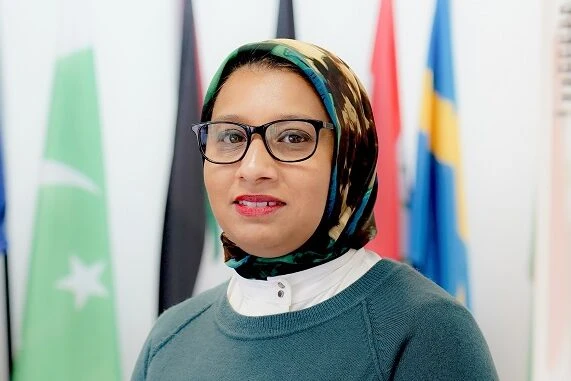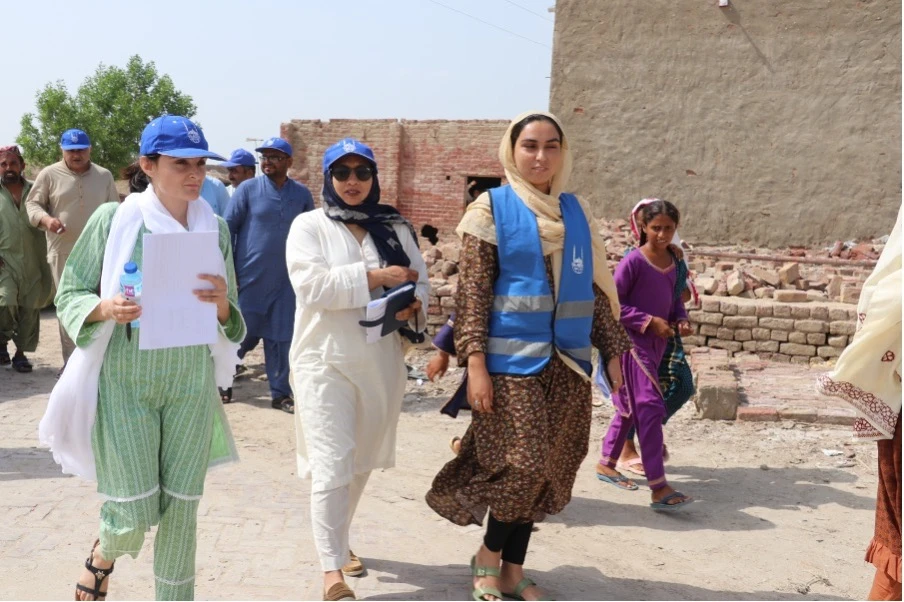World Humanitarian Day is a day dedicated to recognising humanitarian workers and those who have died working for humanitarian causes. Islamic Relief’s head of global advocacy, Shahin Ashraf, talks about why this year’s theme No Matter Who, No Matter Where, No Matter What resonates so much with her.

Two decades ago, we found ourselves at a crossroads in history. On 19 August 2003, we lost 22 humanitarian colleagues in an attack on the United Nations in Baghdad, Iraq. It was a tragedy that profoundly changed the way in which humanitarians operate and led to the creation of World Humanitarian Day.
Now, 20 years on, I find myself reflecting on what this day means, on how our work has grown in scale and complexity, on how delivering aid and life-saving support has changed, and most of all, on the glimmers of hope I’ve seen in places where you would least expect it.
This year’s World Humanitarian Day theme No Matter Who, No Matter Where, No Matter What, encapsulates the very essence of what it means to be a humanitarian. We come together under this banner to celebrate the unsung heroes who inspire hope, no matter the odds.
A global community bonded by empathy
I’ve been fortunate to witness firsthand the incredible reach of our humanitarian efforts throughout our humanitarian community. In places like Ethiopia, Afghanistan, Bangladesh, Pakistan, Somalia, Nepal, and beyond, the indomitable spirit of humanitarians is evident. They navigate treacherous terrains, confront perilous situations, and act as pillars of support, driven by the universal values that connect us all. Their relentless commitment transcends geography and divisions, emphasising that humanity is defined by compassion.
Pakistan: A testament to resilience
A year ago, the devastating floods in Pakistan brought despair to many. Now, at the Islamic Relief office in Larkana, Sindh, I see a glimmer of hope. Our local team has been working tirelessly in scorching 48°C heat, rescuing children, establishing livelihood programmes, and distributing agricultural tools. These heroes embody the very essence of humanity. They remain steadfast, serving as a living testament to the power of resilience.
During my visit, I had the chance to talk to a young farmer whose life was upended by the floods but restored through our agricultural programmes He was full of gratitude and determination as the told me his story, one of thousands touched by our efforts.
In some of the most remote regions of countries like Pakistan, our efforts may be the only lifeline for the afflicted.

An unforgettable encounter in Afghanistan
My work has taken me to the breathtaking landscapes of Afghanistan, where Islamic Relief has been actively supporting vulnerable communities. I met a young woman there, a widow whose husband had abandoned her and her 6 children. She was struggling to make ends meet, but her strength and courage moved me deeply. With the support of Islamic Relief Afghanistan, she has found safety, and education for her children.
Her story was a reminder to me that our work extends beyond immediate relief to empowering individuals to rebuild their lives. It underscores the reason why humanitarian work is not just about aid—it’s about restoring dignity and hope to the most vulnerable.
The stories from Pakistan and Afghanistan are examples of the intricate web of humanitarian work being carried out every day. These field experiences remind us that our shared humanity is our greatest strength, and that, in the face of adversity, empathy and resilience are our most valuable tools.
Looking ahead
The recent tragic loss in Sudan serves as a sombre reminder of the risks humanitarian workers face. Three World Food Programme (WFP) staff were killed as clashes continue in the region. This devastating event is a clear violation of the neutrality of aid workers, who should never be a target. “Threats to our teams make it impossible to operate safely and effectively in the country and carry out humanitarian critical work,” is a sentiment echoing across many organisations.
This has not only hindered the life-saving efforts in Sudan but also sends a chilling message to humanitarians worldwide. Such incidents underline the urgency for all parties involved in conflicts to recognise and respect the neutral status of aid workers, who are there to help those most in need, regardless of who they are or where they come from.
World Humanitarian Day 2023 serves as a call to action for all of us. By embracing the principles of No Matter Who, No Matter Where, No Matter What, we contribute to a legacy and stand in unity, reaffirming our commitment to a world where empathy prevails.
Today, 20 years on, I’m filled with pride and humility as I reflect on how the humanitarian work has expanded and evolved. On this World Humanitarian Day, I invite you to join us, support us, and remember the countless heroes on the frontlines. Their dedication, often in the face of immense adversity, showcases what it truly means to be a humanitarian with Islamic Relief.
Please continue supporting Islamic Relief so that we can reach more people in need. Donate now.
BROWSE OTHER OPINIONS
FEATURED OPINIONS
- Striving for social justice is more important than ever during this most unusual Ramadan
- December in Gaza used to be filled with celebration, this year, there is only fear and sadness
- The people of Morocco have a generosity of spirit stronger than any earthquake
- Iraq emergency Blog #2
- Unlocking the economic potential of women and young people in Kenya
MOST POPULAR TOPIC
View More









